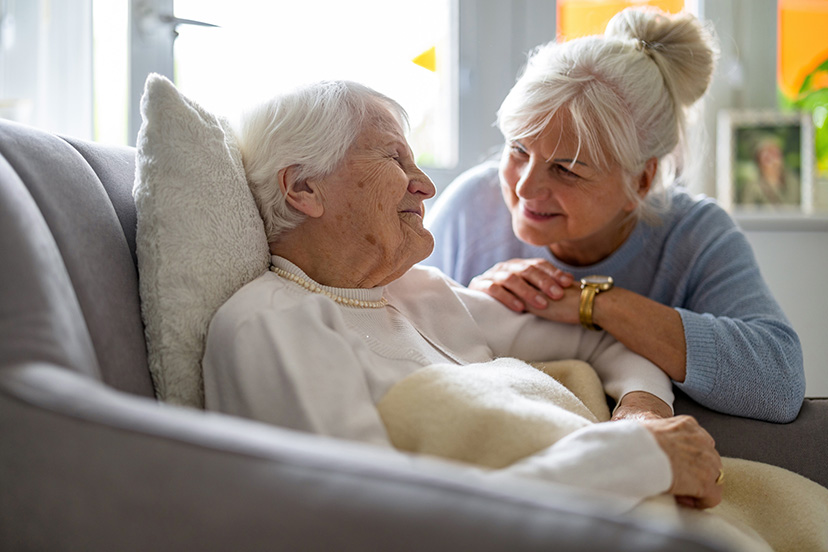
Preventing Caregiver Burnout with Respite Care
How To Take Care of Yourself While Caring for Others
Caregiving can be exhausting and lonely, as anyone who has experienced caregiver burnout knows firsthand. Respite care can provide a much-needed break, helping you achieve a healthy balance between your responsibility and your wellbeing, while ensuring your loved one is receiving compassionate, professional support.
What Is Caregiver Burnout?
Caregiver burnout is a state of physical, emotional and mental exhaustion that happens when you’re taking care of someone else. Stressed caregivers may experience physical, psychological, financial and social effects, including fatigue, anxiety and depression.
While the main responsibility of a caregiver is to keep the person within their care safe and healthy, multiple tasks can be involved. These include helping with bathing, dressing, preparing meals, housework, transportation to appointments, helping with bills and other financial concerns, administering and managing medications, and more.
The list can be long and the pressure tremendous — especially when as a caregiver you are also trying to take care of a family, work full time and handle other responsibilities of daily life.
Recognizing the Signs of Caregiver Burnout
It’s been estimated that more than 60% of all caregivers show signs of burnout. These can include:
- Feeling exhausted emotionally as well as physically
- Pulling away from friends and family
- Losing interest in favorite activities and outings
- Losing or gaining weight
- Problems with concentration
- Experiencing illness more often
- Difficulty sleeping
- Becoming irritable or angry more often
- Developing a weakened immune system, chronic headaches and other ailments
If you are experiencing caregiver burnout, you may go through several emotions in one day. You might start to worry that you are doing something wrong or develop feelings of anger towards the person you are assisting. Over time in your caregiver role, you might begin to feel guilty when you take any time for yourself. And it’s easy to feel everything is up to you, as if you are completely alone.
Self-Care Is Vital
Like any form of recovery, dealing with caregiver burnout is a journey. It takes time, and you may need to try different things until you find what works best for you. And whenever possible, arrange for a family member or aide to stand in for you while you take a break.
- You might try meditation, finding moments where you can sit quietly and focus on your breathing.
- Go for a walk in the sunshine and don’t rush back.
- Schedule time for yourself, even something as ordinary as a dentist’s appointment or eating a well-balanced meal.
- Speak with a professional, such as a psychologist, social worker or mental health professional.
- Join a support group and learn from others who are dealing with caregiver burnout.
Remembering that you can ask for help is also part of the recovery process. You might have to push yourself to do this if you’ve been the sole caregiver for some time. Learn how to say yes to help — and no to adding more to your plate.
Respite Care Could Be the Answer
As defined by the National Institute on Aging, respite care provides short-term relief for primary caregivers, giving them time to rest, travel or spend time with other family and friends. Respite care may last anywhere from a few hours (in an adult daycare center, for example) to several weeks at a time. In this case, respite care in a senior living community offering assisted living is ideal for several reasons.
At The Herrick House, respite care offers a comfortable, safe environment where your loved one can experience the services and amenities our community has to offer while you get a much-needed break. You have the reassurance of knowing that resident care aides and licensed nurses are on site 24 hours a day. Plus, it’s good to know that our affiliation with Beth Israel Lahey Health and our location on the campus of Beverly Hospital ensures additional medical expertise is close by if needed.
Respite care offers the important benefit of opportunities for healthy socialization for your loved one. Research has shown the negative effects of feeling isolated or lonely, while being in a vibrant and caring environment such as assisted living can provide your loved one an array of positive experiences. They will feel part of a caring group and have more reasons to look forward to each new day.
Moving Forward with The Herrick House
As you find relief from the burnout you have experienced, be sure to move forward in a positive direction, remembering to take care of yourself as you go. Some suggestions include:
- Take a step back
- Ask for help
- Forgive yourself
- Say no
- Set boundaries
- Spend time alone
- Put yourself first
At The Herrick House, we believe our respite care is unique. Here, your loved one can enjoy resort-like assisted living in a picturesque setting in Beverly, Massachusetts. And you can take a much-needed rest. We’d love to tell you more.
A lot of little extras make our community special and enhance quality of life. Contact us today, or download our Guide to Respite Care to learn more.



